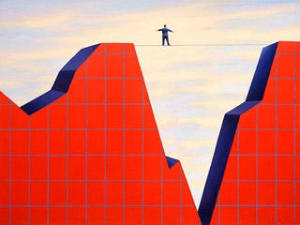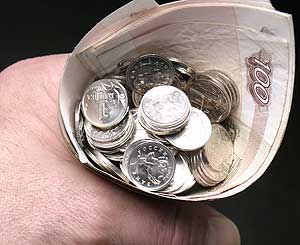 The collapse of the ruble, Western sanctions, the lack of access to foreign financial resources for corporations and the Russian Central Bank’s exorbitant interest rates reaching 15 to 17 percent are having a catastrophic impact on Russia’s economy. Manufacturers are forced to cut production levels, reduce work hours and fire employees. The situation in single-industry cities is especially challenging. Problems are piling up in cities with a million-plus population. Thus, the question of the year 2015 is whether social unrest will escalate into political tensions.
The collapse of the ruble, Western sanctions, the lack of access to foreign financial resources for corporations and the Russian Central Bank’s exorbitant interest rates reaching 15 to 17 percent are having a catastrophic impact on Russia’s economy. Manufacturers are forced to cut production levels, reduce work hours and fire employees. The situation in single-industry cities is especially challenging. Problems are piling up in cities with a million-plus population. Thus, the question of the year 2015 is whether social unrest will escalate into political tensions.
Russian manufacturers compete in different levels of pessimism by daily giving the public more bad news. According to an expert service provider Auto-Dealer-St.Petersburg, in January 2015, automotive production in Russia’s Northern capital, where production facilities of the world’s leading car manufacturers are located, decreased by 36 percent due to a sharp drop in demand. Another piece of bad news is that the unemployment rate in St. Petersburg may increase by one-third.
In the Krasnodar region, 20 percent of companies are planning to downsize this year. According to HeadHunter, top five spheres that will be mostly affected by the “optimization” of workforce related to the current crisis are hotel business and hospitality industry, administrative support, marketing and advertising, accounting and finance and retail. The index of industrial production in the Middle Ural has decreased by 40 percent. With a 50 percent plunge in its volume by December 2014, manufacturing activity proved to be the most severely affected area in January 2015 first of all due to a 72.7 percent drop in production of machinery and equipment, a 68.9 percent decrease in electrical equipment manufacturing and a 63.1 percent drop in transportation equipment manufacturing.
The population’s falling demand affects above all the consumer sector. However, the situation with demand that used to be guaranteed by the state or state-controlled companies does not look better. For instance, the rail car manufacturer Tverskoy Vagonostroitelniy Zavod (TVZ) was forced to sharply downsize its workforce due to the fact that its management cannot be sure it will be able to secure enough orders from Russian Railways JSC (RZD). RZD, a state-owned railway monopoly headed by Putin’s close friend Vladimir Yakunin, had until recently preferred to buy its rolling stock abroad, which has drawn the attention of the Russian President. Russian Railways quickly “mended its ways,” and numerous government meetings began taking place one after another to discuss the possibility of financing RZD’s order for rolling stock from TVZ. This was the only thing that prevented factory workers from organizing mass protests.
Another Russian manufacturer UralVagonZavod put thousands of its workers on forced leave. It is worth mentioning that UralVagonZavod former assembly shop manager and Putin’s current envoy to the Ural Federal District Igor Kholmanskikh once promised to “crush liberal scum with tanks” in Moscow. In an attempt to save budget funds, Russia’s Defense Ministry decided to reduce tank orders which are UralVagonZavod’s flagship product. Only time will tell if tank builders will be willing to drive their combat vehicles to Moscow to obtain new government contracts.
Russians are facing challenging times characterized by the devaluation of ruble deposits, a drop in purchasing power and unemployment. At the same time, polling and sociological research organizations indicate a growth in Putin’s poll standings. This paradox can be easily explained by VTsIOM reports according to which, for the first time in the last fifteen years, two-thirds of Russians have actually been believing there is a military threat from other countries to their nation’s security. Fear of war has become the main weapon of influence on the masses: pro-war rhetoric directed at provoking mass hysteria has become a staple of state-controlled Russian television. At the same time, we are witnessing a full-scale state expansion affecting the country’s economy, industry and people’s private lives. Russia already lived through similar changes once. The Big Soviet Experiment ended in the “greatest geopolitical catastrophe of the 20th century,” as Putin described the demise of the Soviet Union. The Russian people can get through the lack of alternative and survive military threat. The state, on the other hand, may collapse under the pressure of a new experiment.





